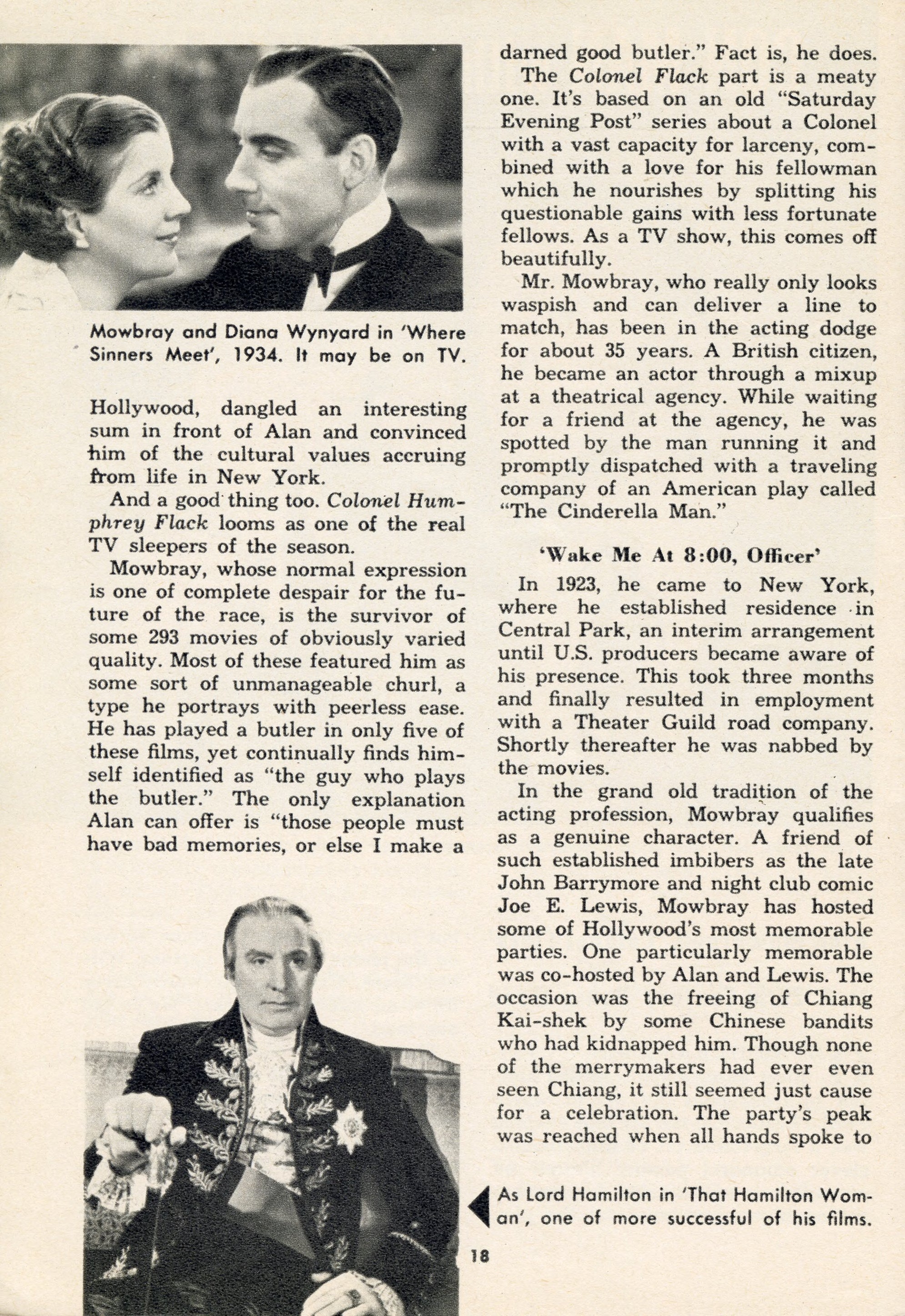Alan Mowbray — Con Man with a Conscience (1954) 🇺🇸

One night a while back, TV Producer Jerry Layton settled himself in front of a TV set to watch Ford Theater. On the air that evening was a forgettable bit of fluff about a clever scoundrel passing himself off as an atomic scientist. Mr. Layton was thoroughly unimpressed by the plot, but halfway through the show he was on the phone calling his partner, Wilbur Stark. Choosing his words carefully, he informed Stark: “We’ve got our man.”
The man they had was Actor Alan Mowbray, and the reason they had him was a property called Colonel Humphrey Flack, with a lead that had gone begging for a man of his talents. Since Mowbray’s Hollywood career could hardly be characterized as ascending, Layton hopped a plane to Hollywood, dangled an interesting sum in front of Alan and convinced him of the cultural values accruing from life in New York.
And a good thing too. Colonel Humphrey Flack looms as one of the real TV sleepers of the season.
Mowbray, whose normal expression is one of complete despair for the future of the race, is the survivor of some 293 movies of obviously varied quality. Most of these featured him as some sort of unmanageable churl, a type he portrays with peerless ease. He has played a butler in only five of these films, yet continually finds himself identified as “the guy who plays the butler.” The only explanation Alan can offer is “those people must have bad memories, or else I make a darned good butler.” Fact is, he does.
The Colonel Flack part is a meaty one. It’s based on an old “Saturday Evening Post” series about a Colonel with a vast capacity for larceny, combined with a love for his fellowman which he nourishes by splitting his questionable gains with less fortunate fellows. As a TV show, this comes off beautifully.
Mr. Mowbray, who really only looks waspish and can deliver a line to match, has been in the acting dodge for about 35 years. A British citizen, he became an actor through a mixup at a theatrical agency. While waiting for a friend at the agency, he was spotted by the man running it and promptly dispatched with a traveling company of an American play called “The Cinderella Man.”
‘Wake Me At 8:00, Officer’
In 1923, he came to New York, where he established residence in Central Park, an interim arrangement until U.S. producers became aware of his presence. This took three months and finally resulted in employment with a Theater Guild road company. Shortly thereafter he was nabbed by the movies.
In the grand old tradition of the acting profession, Mowbray qualifies as a genuine character. A friend of such established imbibers as the late John Barrymore and night club comic Joe E. Lewis, Mowbray has hosted some of Hollywood’s most memorable parties. One particularly memorable was co-hosted by Alan and Lewis. The occasion was the freeing of Chiang Kai-shek by some Chinese bandits who had kidnapped him. Though none of the merrymakers had ever even seen Chiang, it still seemed just cause for a celebration. The party’s peak was reached when all hands spoke to Chiang in China via the long-distance wire.
Mr. Mowbray, in spite of those 293 movies, has been busy on other fronts. He was a flyer in the RAF in the First World War and is still an aviation bug. He has entertained U.S. troops all over the world for years and his work for the U.S. Air Force has gained him an entree into practically all our Air Force bases. He even wrote a play about jet pilots in Korea, “Flame-out,” that came within a few hundred miles of Broadway before dying in Washington, after backers decided a New York newspaper strike would prevent sufficient publicity. Mowbray still feels that it was a potential hit through word-of-mouth and claims audiences on the road loved it. He has since authored four movie scripts and has another play ready for production at the Pasadena Playhouse.
In his piloting hobby, Alan recently passed the 100,000-mile mark and has flown Air Force jets. He has also passed the urge on to his son, Alan, Jr., who is in the U.S. Air Force.
As Colonel Flack, Alan may be another of those movie players who had modest success on the screen, then blossomed into full-fledged stars on television. As a shady dealer with a touch of Robin Hood, Mowbray, for a change, is playing a character people can warm up to. Strictly a fictional chicaner, Mowbray finds the Flack role has drawbacks. A recent script called for him to weasel out of a restaurant check by finding a piece of glass in his soup. A few weeks later, he did find a piece of glass in his soup, while dining at a Broadway restaurant. He was about to complain, then decided that the waiter might have seen the show.
Mowbray is still a British citizen, though he accuses his wife, a Chicagoan to whom he’s been married for 23 years, of being a foreigner. Besides Alan, Jr., they also have a daughter, Patricia, a 22-year-old with acting aims which may be fulfilled when she appears in her father’s latest play.

Frank Jenks, left, and Alan Mowbray: larceny in their minds, charity in their hearts.
Alan Mowbray’s ‘Colonel Flack’ Is A 20th Century Robin Hood

Mowbray and Diana Wynyard in ‘Where Sinners Meet’, 1934. It may be on TV.
As Lord Hamilton in That Hamilton Woman, one of the more successful of his films.

Today: Mowbray takes time from TV to welcome wife and daughter to New York.
Collection: TV Guide (Chicago), March 1954
